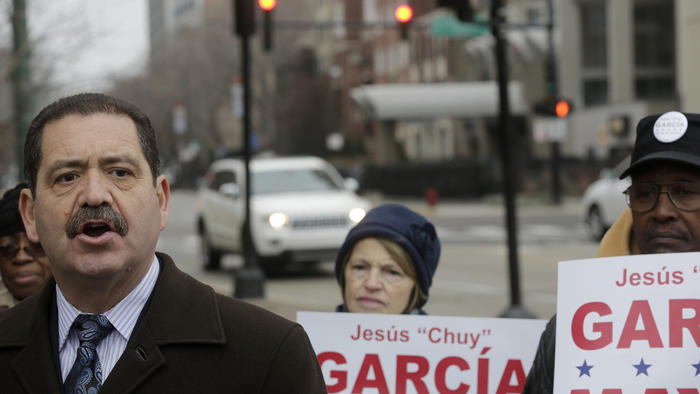Mayoral challenger Jesus “Chuy” Garcia promised to remove the city’s controversial red light cameras on his first day in office, casting the automated ticketing program as a “rip-off” effort from Mayor Rahm Emanuel.
“It’s time to end the red light rip-off,” Garcia told reporters Thursday at his campaign headquarters on the Near West Side. “No more tickets.”
However, Garcia didn’t specify how the city might recoup nearly $70 million a year in lost revenue from the camera-generated tickets. Detailed plans for Chicago’s finances will come next week, said Garcia, who argued that his stance on the camera program has nothing to do with the city budget.
“This is not an issue of revenue,” said Garcia, a Cook County commissioner challenging Emanuel in the April 7 runoff. “This is about safety. This is about being honest with Chicagoans that the budget isn’t going to be balanced on their backs.”
Garcia’s announcement Thursday marked his latest position on the red light camera program. In December he said he “would keep only those cameras that can be fully proven to have reduced accidents. And those cameras that simply provide the city another way to pick our pockets should be shut down immediately.”
In January, Garcia signed a protest group’s pledge to repeal the program. And last month he called for suspending the program while “an independent study” determines which cameras improve traffic safety.
Asked about his previous positions Thursday, Garcia replied: “What I’m saying is that we will get rid of all the red light cameras because the program is flawed. The real motivation for it has always been to raise revenue.
“We will remain open to discussions and debate and analysis about whether anything is warranted,” he added. “But they will go because Chicagoans want them gone.”
Garcia’s revised position on red light cameras is his second change of course this week. On Monday he reversed his monthslong opposition to allowing a Barack Obama presidential library to be built on city parkland.
The city has a red light contract with Xerox State & Local Solutions that it can suspend and end for a variety of reasons, but it could still be liable for early termination fees and other compensation. Garcia said Emanuel’s administration should be responsible for escaping the contract.
“The contract will be ended,” he said. “We have a responsibility to ensure the welfare and safety of Chicagoans. Ending the red light camera program is one of those ways that we will further that cause.”
On Thursday, Emanuel’s campaign issued a statement defending the red light camera ticketing program.
“These systems, which are used in hundreds of cities around the world, save lives and keep police on the beat taking on gangs and guns rather than writing speeding tickets,” said Steve Mayberry, a spokesman for Emanuel’s campaign.
A series of Tribune reports last year have exposed the Emanuel administration’s failed oversight, unfair enforcement practices and bogus claims about safety benefits from the cameras.
Garcia referenced a Chicago Tribune-commissioned study from the Texas A&M Transportation Institute that belied Emanuel’s claims that the more dangerous T-bone crashes are down 47 percent at red light camera intersections. The claim was based on faulty statistics and dubious science, according to national traffic safety experts.
The Tribune study found only a 15 percent reduction of T-bone crashes with injuries, offset by a 22 percent increase in rear-end crashes that resulted in injury. The cameras had no safety benefit at intersections that never had much of a crash problem before their installation, according to the study, raising questions about why they were installed in the first place.
The Tribune also found that Chicago’s yellow light times are dangerously short and out of step with those of other major cities, citing national research and experts who said longer yellows significantly reduce crashes and red light citations.
On the stump and during debates, Emanuel points out that he fired the former vendor amid Tribune reports detailing how the program was allegedly born of a $2 million bribery scheme at City Hall. The mayor also says he has instituted reforms to make the program more transparent, and shut down 32 of 384 cameras around the city.
Emanuel’s office has yet to explain the causes for dozens of wild spikes in tickets at intersections around the city that unfairly tagged tens of thousands of motorists with $100 fines — spikes that national experts say were caused by human tinkering, faulty equipment or both. An inspector general’s investigation in response to the Tribune stories was stymied by a lack of city maintenance records
Source: Chicago Tribune















































































































































































































































![[Video] Chicago Police Officers Caught On Video Telling Two Black Men "We Kill Mother F**kers"](https://earhustle411.com/wp-content/uploads/2018/07/evil-cop-3-300x180.jpg)
![[Video] Chicago Police Officers Caught On Video Telling Two Black Men "We Kill Mother F**kers"](https://earhustle411.com/wp-content/uploads/2018/07/evil-cop-3-80x80.jpg)












![[Video] White Woman Calls The Cops On Black Real Estate Investor, Cops Threaten To Arrest Her For Harassing Him](https://earhustle411.com/wp-content/uploads/2018/05/nosy-neighbor-300x180.png)
![[Video] White Woman Calls The Cops On Black Real Estate Investor, Cops Threaten To Arrest Her For Harassing Him](https://earhustle411.com/wp-content/uploads/2018/05/nosy-neighbor-80x80.png)


![White Scientist Says The Black Community Is Being Targeted By The Medical System, They Are Deliberatly Being Poisoned [Video]](https://earhustle411.com/wp-content/uploads/2016/05/mike-adams-300x180.jpg)
![White Scientist Says The Black Community Is Being Targeted By The Medical System, They Are Deliberatly Being Poisoned [Video]](https://earhustle411.com/wp-content/uploads/2016/05/mike-adams-80x80.jpg)








![Teenage Girl Shot In Her Stomach Three Times But Took Time To Post To Facebook [ Video]](https://earhustle411.com/wp-content/uploads/2016/02/Gangster-chick-300x180.jpg)
![Teenage Girl Shot In Her Stomach Three Times But Took Time To Post To Facebook [ Video]](https://earhustle411.com/wp-content/uploads/2016/02/Gangster-chick-80x80.jpg)







